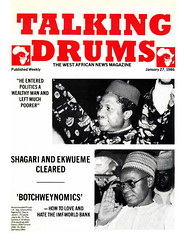Book Review - South Africa in Socio-Historical Perspective
TITLE: The Roots of Crisis in South Africa.
AUTHOR: Ann Seidman.
PUBLISHER: Africa World Press, P.O Box 1892, Trenton, New Jersey, USA.
PRICE: $19.95, hardback; $8.95, paperback.
REVIEWERS: A. B. Assensoh & Irenita Benbow Assensoh.
Life and politics in the nations of southern Africa are, at varied levels, a tragedy of unlimited proportions. Yet, it takes only the unbiased and historically sophisticated commentator to present an accurate picture of the controversial issues at stake. It is in this context that readers are expected to view Ann Seidman's The Roots of Crisis in Southern Africa, published for the first time in November 1985.In the 209-page treatise, Ms. Seidman has successfully explained the dynamics of the deeply seated crisis which has, over the years, confronted the leaders and people of southern Africa in particular and all other Africans in general. Specifically, the author has very ably analysed the causes and effects of South Africa's domination of the entire region and, graphically, shown how the apartheid leadership in Pretoria has also denied basic human rights to the black majority in their own country.
Divided into seven chapters of varied topics, The Roots of Crisis in Southern Africa offers a thought-provoking scrutiny of numerous pertinent issues affecting southern Africa, including the roots of the ethnic crisis in the region, institutionalised poverty, outright apartheid policies, trans- national corporate investments, South Africa's virtual domination of the region, institutionalised poverty, outright apartheid policies, transnational corporate investments, South Africa's virtual domination. of the region, U.S. policies in the area and the need for an alternative policy if peace is to be restored in southern Africa. Above. all, the various appendices, references and the detailed index add to the resourceful- ness of the book.
The volume, by itself, is a very useful companion to many of the works which already exist in the field of southern African studies. Such works include Professor Richard Hull's Southern Africa: Civilizations in Turmoil; R.W. Johnson's How Long Will South Africa Survive?; Thomas M. Callaghy's South Africa In Southern Africa: The Intensifying Vortex of Violence, and Howard Brotz's The Politics of South Africa: Democracy and Racial Diversity.
Apart from the book's relevance to southern African issues, it is so well researched and produced that, to an extent, it should also be seen as a sequel to Walter Rodney's How Europe Underdeveloped Africa. This is especially so because the analysis goes beyond southern African politics and socio-economic problems. This fact has, indeed, been confirmed by Professor Mel King of the prestigious Massachusetts Institute of Technology. In his assessment, Ms. Seidman's book should be seen as "a basic primer which analyzes the impact of neo-colonialism".
Above all, the powerful foreword to the book by Rev. Carr adds weight to its overall importance and relevance. Rev. Carr used the opportunity to undermine the "constructive engagement" policy of the Reagan Administration.
The Liberian-born Rev. Carr, who formerly served in Kenya as the general secretary of the All-Africa Conference of Churches, stressed: "One cannot overstress how critical it is that this Impact Audit is being published at this time, when events within South Africa are revealing so clearly the bogus character of President Reagan's 'constructive engagement' policy. The policy must be reversed. This book offers the reasons why and some alternatives that would place the United States on the side of liberation, justice, and human development in southern Africa."
Apart from serving currently as an associate professor in the Yale University Divinity School, Rev. Carr is also a member of the board of Oxfam America, which has tried and successfully channelled private donations to those areas of Africa in dire need of aid as a result of natural disasters, including drought. Reassuringly, Ms. Seidman confirms in her work that various Oxfam specialists contributed to the success of The Roots of Crisis in Southern Africa. Such contributions included the author's reliance on the reports of project holders and officers in and outside southern Africa, discussions of staff members and the availability of researched reports by students and interns in the Boston office of Oxfam.
The book should be useful to students and specialists on Africa. Ms. Seidman has relied on recent empirical material to produce her work in the modern context.
